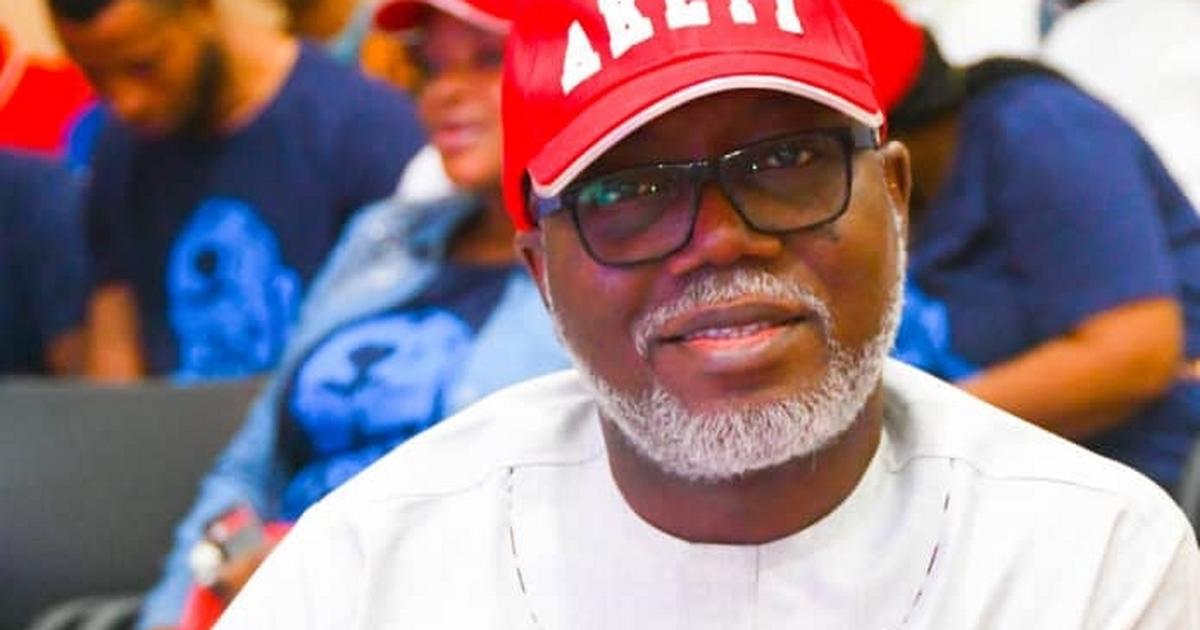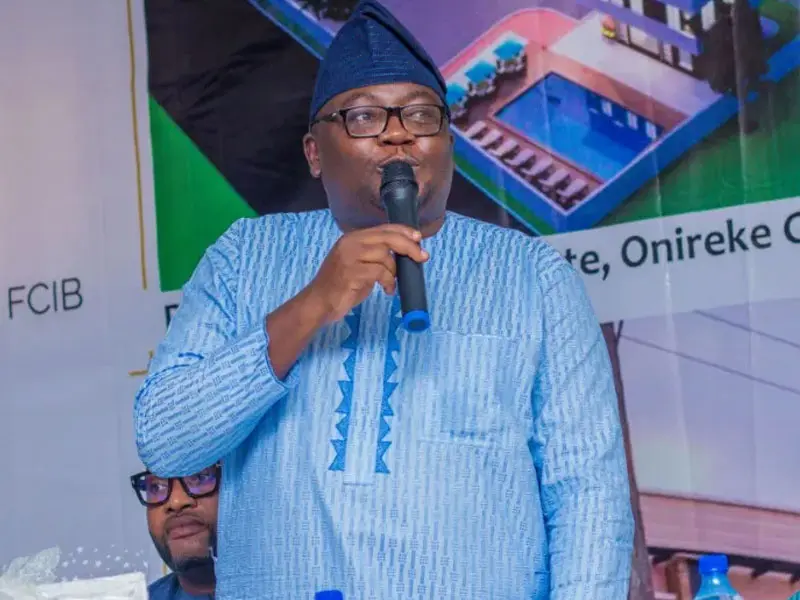Opinions
2023: Why Seye Oladejo Deserves To Represent Mushin II At House of Reps By Sesan Oluwaseun
There have been records of great men and women who have distinguished themselves in public office, especially in Nigeria. But one man that has distinguished himself in public service and political party organisation is Hon. Oluwaseye Olaniran Oladejo, popularly known as Seye Oladejo.
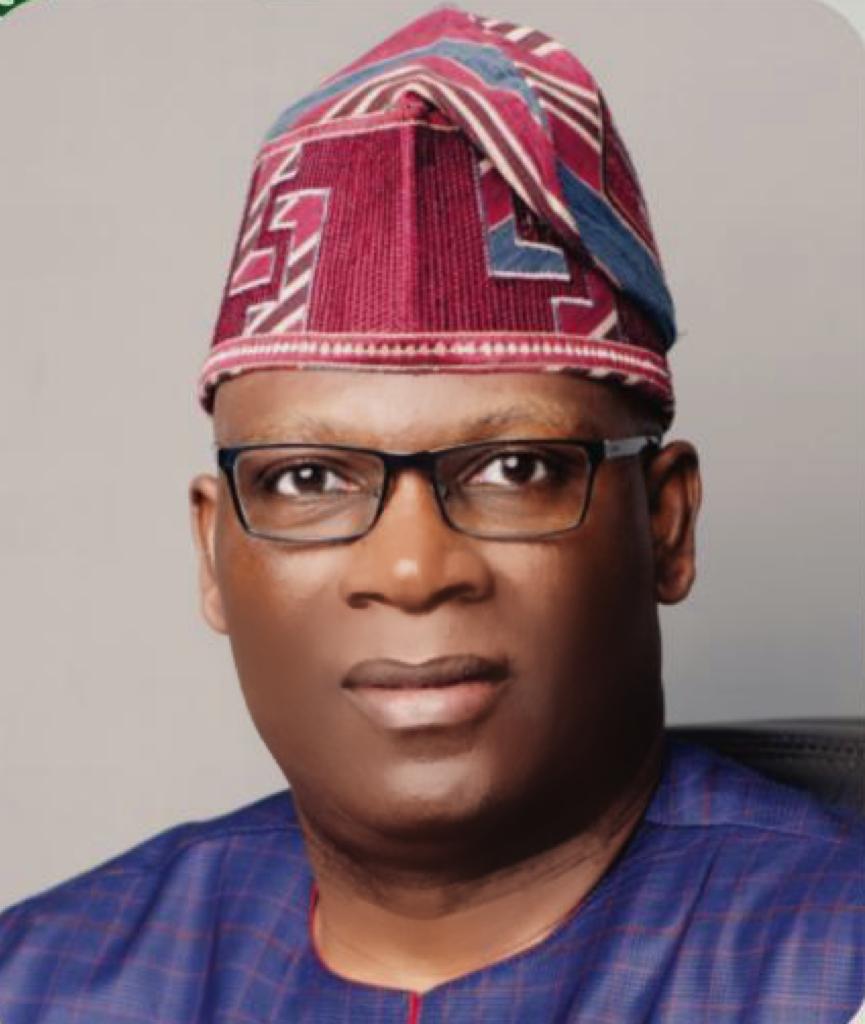
John F. Kennedy in his inaugural address on January 20, 1961, said “Ask not what your country can do for you – ask what you can do for your country.” Kennedy’s inaugural address has inspired generations to see the importance of public service for the development of their community, state and nation.
There have been records of great men and women who have distinguished themselves in public office, especially in Nigeria. But one man that has distinguished himself in public service and political party organisation is Hon. Oluwaseye Olaniran Oladejo, popularly known as Seye Oladejo.
Oladejo born over fifty years ago has contributed immensely to party politics and governance, not only in Mushin Local Government Area but Lagos State at large. He has been an active participant in local and state politics for almost three decades serving in different positions.
Oladejo displayed leadership traits at an early age serving meritoriously as the Library Prefect in his secondary school, Archbishop Aggey Memorial Secondary School, Ilasamaja, Mushin. Young Oladejo was also an active participant during his undergraduate days in the Great Ife – the University of Ife now Obafemi Awolowo University (OAU). He served as the President of his departmental association, IFEVARSITY Literary and English Studies Society. He contested and won an election into the office of the Secretary-General of the University of Ife Students’ Union (1985/86) at 19 years of age.
As the Secretary-General, he was the engine room of the Students’ Union Government. He took care of the general administration and coordinated activities geared towards the rights and welfare of students and the pro-democracy programmes in the heydays of the military misadventure into governance. This, no doubt, came with its sacrifices with incessant harassment by state agents and at times outright incarceration.
His involvement in the democratic struggle prepared him for the bigger challenge of partisan politics with its unpredictability and uncertainties.
After graduating from the University of Ife, he had his one-year National Youth Service Corps (NYSC) scheme in Yola, the then Gongola State. He won the State Award for Outstanding Service.
As a young man with passion who is ready to contribute to the society through qualitative service delivery, Oladejo’s career took him to the Directorate of Mass Mobilization (MAMSER), Daily Times of Nigeria and Goldlink Media. It was during this period that he cut his teeth in media practice and public engagement.
In his quest to serve and render quality service to his community, Oladejo pitched his tent with the progressives during the aborted Third Republic, serving in different capacities on the platform of the Alliance for Democracy (AD). He was at different times the Ward Secretary for AD in Ward H1 and later Local Government Publicity Secretary for AD, all in Mushin Local Government Area. He also contested and won election as Executive Chairman of Mushin Local Government Area in 2004.
His tenure as the Chairman of Mushin Local Government was not deterred by the insensitive and malicious seizure of monthly allocation of local governments in Lagos State by then President Olusegun Obasanjo government. Oladejo as a manager of human and capital resources did excellent work while in office. He constructed roads and drainages with available resources. He also impacted the education sector with the rehabilitation of primary schools, provision of desks, benches and books for the pupils. Primary Health Centers in the local government were re-equipped and rehabilitated.
The Oladejo administration also established new health centers at Ogungbaye and Ijesha road. He also embarked on social intervention programmes by supporting the aged, widows and other vulnerable people. However, a major and impactful highlight of the administration was the provision of 165 boreholes across the local government.
Some of these projects are still in use 15 years after.
Having distinguished himself at the local government level, Oladejo like a golden fish that cannot be hidden was promoted to the state level after completing his tenure as Chairman of Mushin Local Government Area. He worked with two governors for eight years. He was the Special Adviser for Commerce and Industry in the cabinet of Governor Babatunde Raji Fashola between 2011 and 2015 and later also served as Commissioner for Special Duties and Inter-governmental Relations during Governor Akinwunmi Ambode’s administration from 2015 to 2019.
The highlight of his service in the state cabinet during his stewardship in the Fashola administration included the reinvigoration of the informal sector to enhance productivity through the re-skilling of master artisans; exposing them to modern technologies and providing the needed tools to boost the sector. His ministry also supervised the operations of the Lekki Free Trade Zone, which led to among others, the establishment of the Dangote Refinery which is nearing completion. The ministry also facilitated the establishment of the Industrial Park where the Imota Rice Mill is located, the Lekki Airport and the Badagry Dry Sea Port. The Lagos Consumer Protection Agency was also under his direct supervision before it became a full-fledged agency.
As the Commissioner for Special Duties and Inter-governmental Relations, Oladejo managed emergency services in Lagos State. The Lagos State Emergency Management Agency was rebranded during his tenure with the state of the art equipment, professional personnel and decentralised for efficient service delivery. The re-organisation led to the construction of LASEMA RESCUE centers at Epe, Lekki and Cappa. It also led to the synergy among the various government agencies – fire service, Police and ambulance service, among others in rescue operations in the state. The Emergency free toll numbers also became more efficient. The Lagos State Neighborhood Corps was also rebranded for efficiency, re-trained and re-equipped to meet the challenge of modern times.
He also supervised the Nigerian Legion, Para-military bodies like the National Youth Service Corps (NYSC), the Nigerian Civil Defence Corps and the Development Agenda for Western Nigeria (DAWN).
Based on his experience in public service and media relations, the Lagos State chapter of the All Progressives Congress (APC) fished out Oladejo in a moment of need and appointed him Publicity Secretary in 2019. He has been the spokesman of the ruling party in the last two years. He gladly accepted this as a call to service at another level. It was no doubt an opportunity to give back to the party.
Within a short period of Oladejo’s assumption of office as the spokesman of Lagos APC, the information machinery of the party became invigorated as a result of his years of experience in the media, party politics and government. He was able to successfully leverage on this to respond effectively and professionally to burning issues in politics and governance. The opposition was unable to overwhelm the APC as the ruling party with needless criticism and propaganda. It is of note that the Publicity office at the Lagos APC’s secretariat on Acme Road, Ikeja, has remained accessible, informative and efficient in delivering in its mandate.
For almost three decades, Hon. Seye Oladejo has proved beyond reasonable doubt that he is someone to be trusted with public office. He has shown accountability and transparency in service at local and state levels. He has also served his party passionately at local and state levels. Seye Oladejo is an amiable and experienced grassroots politician whose consistency, commitment and passion to the progressive course remain unrivaled.
2023: Why I Am Supporting Tinubu – Kanu Nwankwo
He is known to be a good communicator and networker, whose peculiar talents will come in handy in the hallowed chambers of the House of Representatives. This is one of the reasons why Seye Oladejo has been receiving support and clarion calls from different quarters to contest for Mushin II Federal Constituency seat in the House of Representatives based on popular demand for qualitative representation in the lower chamber of the National Assembly. And as a man who is passionate about public interest above personal interest, Seye Oladejo has decided to yield to the clarion call of his people to serve to avail them of his years of experience serving across various strata in the party and government.
His main promise to the people of Mushin II Federal Constituency if given the opportunity to represent them in the Green Chamber is to provide robust, guarantee qualitative, discerning, visible and result-oriented representation for his constituency. Oladejo will also leverage on the experience of best hands in Mushin II Federal Constituency to provide the desired representation in every sense of the word to his constituents.
His selling point remains several years of consistency in the progressive camp, reliability to efficiently and passionately to deliver on assignments and principled stand on the side of the common man at all times.
As a democrat and firm believer in the rule of law, Oladejo if given the opportunity to represent Mushin II Federal Constituency at the National Assembly, Seye Oladejo will collaborate with other colleagues in the House of Representatives to review some laws that have remained a clog in Nigeria’s spirit of true federalism to engender progress, unity and fair-play. He is also expected to legislate laws in conjunction with the constituents that will make life more meaningful and abundant for the citizenry. Oladejo having proved his worth in the past as a committed public officer, is going to be a visible, listening and active legislator in the Green Chamber. He will do this and many other great things to fulfill his part of the social contract with the people and collaborate with other arms of government to bring unquantifiable benefits to his constituency.
*Sesan Oluwaseun writes from Lagos_
Opinions
10 ways the Tax Bills will make states richer
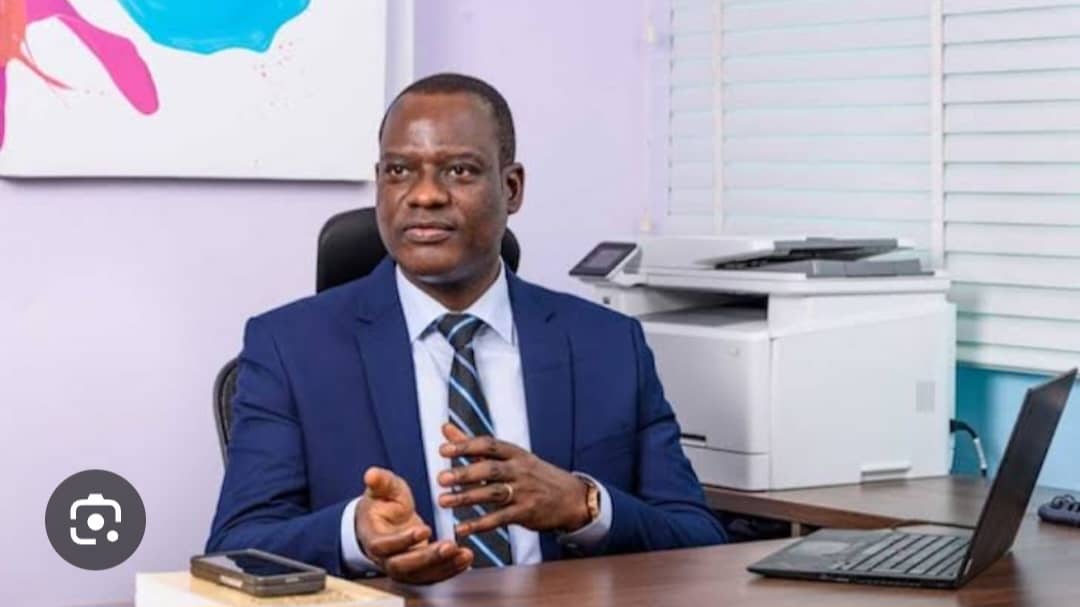
By Temitope Ajayi
Human beings naturally resist change. When comfortable where we are, we find it extremely difficult to embrace an uncharted path or seek greater glory. Those who are risk averse often don’t want to venture out to embrace unfamiliar territories no matter how tempting the possible reward may appear. We should not, however, be so imprisoned by the fear of the unknown not to explore new possibilities because we find our present circumstances satisfying enough.
Since the public debate around the Tax Reform Bills started, the strongest push back against it has come largely from the north. Borno State Governor, Professor Babagana Zulum has become the face of the resistance for the reasons he has pushed forward, even when some of them didn’t speak to the facts and provisions of the bills.
If Governor Zulum and other voices of resistance who think the states will be shortchanged had actually taken time to examine the four executive Bills, they will see how progressive and transformative the Bills are. They will also discern the thought behind them which is primarily to make both the Federal and sub-nationals fiscally stronger and buoyant.
In his public presentations and the most recent being the Channels TV Town Hall moderated by Seun Okinbaloye Monday evening, Chairman of Presidential Committee on Tax and Fiscal Policy Reforms, Taiwo Oyedele and other panelists again made convincing arguments for the passage of the Bills before the National Assembly.
Here are the 10 ways the Tax Bills will serve the states better and enhance their capacity to earn more revenue:
1. The federal government will cede 5% out of its current 15% share of VAT revenue to states.
2. The Bills will transfer income from the Electronic Money Transfer levy exclusively to states as part of stamp duties.
3. The Bills seek to repeal obsolete stamp duties law and re-enactment of a simplified law to enhance the revenue for states.
4. Under the new dispensation the Tax Bills will usher in, states will be entitled to the tax of Limited Liability Partnerships.
5. When passed by the National Assembly, the Tax Bills will enable the state government to enjoy tax exemption on their bonds to be at par with federal government bonds.
6. Under the proposed tax reform, states will enjoy a more equitable model for VAT attribution and distribution that will lead to higher VAT income.
7. Integrated tax administration will provide tax intelligence to states, strengthen capacity development and collaboration, and scope of Tax Appeal Tribunal to cover taxpayer disputes on state taxes.
8. The proposed tax laws grant powers for Accountant General of the Federation to deduct taxes unremitted by a government or MDA and pay to the beneficiary sub-national government on personal income tax of workers of federal institutions in states.
9. Framework to grant autonomy for states internal revenue service and enhanced Joint Revenue Board to promote collaborative fiscal federalism.
10. Legal framework for taxation of lottery and gaming and introduction of withholding tax for the benefit of states.
From the aforementioned, it is clear that the Tax Bills are not in any way injurious to the states. Apart from streamlining the tax system in Nigeria and catalysing economic output, the tax and fiscal policy reforms provide incentives for states to become economic powerhouses. The challenge for governors will be to put on their thinking cap by investing in manpower and critical social and physical infrastructure in their states that will support businesses and socio-economic activities to flourish.
-Ajayi is Senior Special Assistant to the President on Media and Publicity
Opinions
Forging Ahead: The Evolving Nigeria-South Africa Alliance

By Sunday Dare
As Nigeria and South Africa hold the 11th session of Nigeria-South Africa Bi-National Commission, in Cape Town, on Tue Dec 3, 2024 it is trite to establish the contours of their relationship and to thank President Tinubu for keeping faith with Africa’s other big brother.
The radar on Nigeria again shifts to South Africa witnessing three weeks of unprecedented shuttle political and economic diplomacy.
President Bola Tinubu’s co-chairmanship of the 11th Nigeria-South Africa Bi-National Commission (BNC) alongside President Cyril Ramaphosa marks a significant diplomatic step towards fostering stronger bilateral ties.
This meeting, which coincides with the 25th anniversary of the BNC, underscores the importance of high-level engagements between Africa’s two largest economies.
As Nigeria and South Africa convene the 11th session of the Nigeria-South Africa Bi-National Commission (BNC) in Cape Town on Tuesday, December 3, 2024, it is imperative to reflect on the historical and evolving contours of their relationship. This milestone session, coinciding with the 25th anniversary of the BNC, serves as a testament to the resilience, ambition, and shared vision of Africa’s two largest economies. It is also a fitting moment to commend President Bola Ahmed Tinubu for his unwavering commitment to fostering robust ties with Africa’s other “big brother,” South Africa.
In the wake of three weeks of intense shuttle diplomacy spanning political and economic arenas, Nigeria’s radar is again fixed on South Africa. These engagements underscore a mutual recognition of their intertwined destinies in shaping Africa’s future.
As leaders, policymakers, and stakeholders converge in Cape Town, the air will be laden with both expectation and nostalgia—a poignant reminder of a partnership that has endured triumphs, challenges, and moments of historic significance.
One cannot but recall May 1990, when Nelson Mandela, few months after his release from Robben Island, embarked on a state visit to Lagos. That moment, etched in the annals of African solidarity, rekindled the bond between Nigeria and South Africa, catalyzing a renewed era of collaboration. It was a symbolic bridge, uniting the aspirations of two nations whose struggles and victories have defined the narrative of Africa’s journey toward liberation and unity.
This week, Cape Town becomes the stage for another chapter in this storied relationship. With the BNC serving as a platform for dialogue and cooperation, the two nations are poised to reaffirm their roles as co-architects of a continent driven by shared prosperity, peace, and purpose. Their ability to navigate the currents of history while embracing the opportunities of the future demonstrates that this partnership is, indeed, coming of age.
Established in 1999, the Nigeria-South Africa BNC is a structured platform aimed at enhancing cooperation across political, economic, and social sectors. Over the years, the commission has evolved into a key mechanism for dialogue, addressing shared challenges, and fostering sustainable development.
This year’s session, encompassing eight working groups, highlights both nations’ commitment to addressing mutual priorities: These key priorities include political consultations (ensuring stability in regional and global contexts), consular and migration Issues (addressing concerns such as xenophobia and facilitating smoother relations), banking and finance (exploring avenues for economic integration), defence and security (trackling transnational crimes and terrorism), as well as manufacturing and trade (including strengthening intra-African trade under the African Continental Free Trade Agreement, AfCFTA). Also covered are mines and energy (leveraging natural resources for mutual benefit, social sector development (promoting education, healthcare, and culture), and trade and Investment (expanding business opportunities for both nations).
The philosophical underpinnings for the BNC embodies principles of Pan-Africanism, Ubuntu, and liberal institutionalism, emphasizing unity, collective progress, and institutionalized cooperation. As Nelson Mandela aptly stated, “The greatest glory in living lies not in never falling, but in rising every time we fall.” This captures the essence of overcoming historical frictions to achieve a united African future.
President Tinubu’s leadership in this context is pivotal, reflecting Nigeria’s strategic role in Africa’s socio-economic and political landscape.
A discussion of the ongoing efforts would be incomplete without referencing philosophical concepts that accentuate its significance.
Rooted in the works of W.E.B. Du Bois, Kwame Nkrumah, and Julius Nyerere, Pan-Africanism emphasizes the solidarity of African nations to combat external domination and promote socio-economic progress. The BNC reflects this ideal by uniting Nigeria and South Africa as pillars of African development. As Kwame Nkrumah once said, “The forces that unite us are intrinsic and greater than the superimposed influences that keep us apart.”. This quote underscores the importance of Nigeria and South Africa overcoming historical challenges, such as xenophobia, to focus on collective progress.
The BNC’s deliberations and MoUs can be seen as an extension of this principle. According to Aristotle, “The good of the people must be the great aim of government.” The Southern African philosophy of Ubuntu, often translated as “I am because we are,” aligns with the spirit of the BNC. It emphasizes interconnectedness, mutual respect, and the collective good. Ubuntu offers a philosophical lens through which Nigeria and South Africa can navigate shared challenges and opportunities. As Desmond Tutu once reflected: “We can only be human together: hence, the essence of collaborative efforts in fostering a united African front.
Beyond these, the Dependency Theory, associated with scholars like Andre Gunder Frank, critiques the global economic system’s perpetuation of underdevelopment in the Global South. By strengthening intra-African trade and reducing reliance on foreign powers, Nigeria and South Africa can challenge these structures through platforms like the BNC. Joseph Stiglitz’s words that “Development is about transforming the lives of people, not just transforming economies,” aligns with the BNC’s goals of translating economic growth into meaningful societal impacts.
The pragmatic effort to address specific issues in trade, security, and development stresses the responsibility of both leaders to focus on concrete outcomes over rhetoric. More importantly, it refects the basic principles of African Renaissance. Championed by scholars like Cheikh Anta Diop and Thabo Mbeki, the African Renaissance envisions a continent reclaiming its rightful place in global affairs through unity, cultural revival, and economic development. The BNC is a practical manifestation of this vision.Certainly, Tinubu and Ramaphosa are evoking the shared identity and destiny of Nigerians and South Africans in fostering an African Renaissance. The BNC serves as a practical example of liberal institutionalism, fostering dialogue and collaboration in a structured manner. As Martin Luther King Jr once stated, “We must learn to live together as brothers or perish together as fools.” This underscores the imperative for sustained collaboration through institutions like the BNC.
Constructivism suggests that international relations are shaped by ideas, identities, and shared values rather than mere material factors. Therefore, the symbolic 25th anniversary of the BNC is a reflection of the shared identity and history of Nigeria and South Africa.
According to John Maynard Keynes, “The ideas of men, their dreams and visions, are much more powerful than material forces.” The role of shared visions in shaping Nigeria-South Africa relations cannot be over-emphasized.
Shared History
The history of Nigeria-South Africa relationship runs through the period of Anti-Apartheid Solidarity of 1960 – 1965, through Post-Apartheid engagement that started in 1999. Nigeria was a leading supporter of South Africa’s liberation movement. Between 1960 and 1995, Nigeria committed substantial financial and diplomatic resources to the anti-apartheid struggle, offering refuge and education to South African exiles like Thabo Mbeki.The Bi-National Commission, established in 1999, institutionalized bilateral cooperation. However, relations have faced challenges, including xenophobic attacks in South Africa and trade imbalances.
The current nature of the two countries’ economic relations shows that Nigeria’s oil exports and South Africa’s industrial expertise complement each other. Opportunities under AfCFTA and energy collaboration highlight the untapped potential of this relationship. Looking ahead, it is rather easy to see that with strong historical ties and shared visions, Nigeria and South Africa are well-positioned to lead Africa’s socio-economic transformation.
From Anti-Apartheid Solidarity to Economic Collaboration
The Nigeria-South Africa relationship is a tale of resilience, solidarity, and transformation, deeply rooted in shared historical, political, and economic narratives. As Africa’s largest economies, the two nations have carved distinct yet intertwined paths that highlight their roles as both leaders and collaborators in shaping the continent’s destiny. From Nigeria’s pivotal support during South Africa’s anti-apartheid struggle to their evolving economic partnership, this relationship embodies the essence of African unity. Yet, it has not been without its challenges, marked by moments of friction and unresolved tensions.
The forthcoming 11th session of the Nigeria-South Africa Bi-National Commission (BNC) in Cape Town provides a fitting occasion to reflect on this storied partnership. With the backdrop of the 25th anniversary of the BNC, it is an opportune moment to examine how the two nations have evolved from their shared fight for justice to becoming co-architects of Africa’s economic and political renaissance.
The roots of the Nigeria-South Africa partnership lie in the era of apartheid, where Nigeria emerged as one of the most steadfast allies of the African National Congress (ANC) and other liberation movements in South Africa and Nigeria’s key contributions cover:
• Diplomatic Advocacy: Nigeria was a vocal opponent of apartheid on global platforms such as the United Nations and the Commonwealth, pushing for sanctions and isolating South Africa’s apartheid regime diplomatically.
• Financial and Material Aid: Under initiatives such as the “Mandela Tax,” successive Nigerian governments provided significant financial and logistical support to the ANC. Over the decades, Nigeria is estimated to have spent over $61 billion in its efforts to dismantle apartheid.
• Educational and Cultural Solidarity: Nigeria welcomed South African exiles and offered scholarships to ANC members, including figures like Thabo Mbeki, who studied and lived in Nigeria during apartheid. Nigerian universities served as sanctuaries for intellectual and political development for many South African activists.
• Civil Society Advocacy: Nigerian artists, intellectuals, and activists utilized literature, music, and advocacy to raise global awareness of the atrocities of apartheid and rally international solidarity.
Nigeria-South Africa relations in the post-apartheid era reflects collaboration, along with some measure of frictions. With apartheid dismantled in 1994 and Nelson Mandela’s election as South Africa’s first democratic president, the dynamic between the two nations transitioned from solidarity to collaboration. However, this new era was also punctuated by moments of tension.
Collaborative Achievements
• Institutional Frameworks: The establishment of the Bi-National Commission in 1999 formalized a structured approach to bilateral engagement.
• African Leadership: Both nations played pivotal roles in initiatives such as the African Union (AU) and the New Partnership for Africa’s Development (NEPAD), advancing the African Renaissance.
• Economic Ties: South African corporations such as MTN, Shoprite, and Multichoice became prominent players in Nigeria’s economic landscape, fostering trade and investment.
Sources of Tension:
• Xenophobia: Recurrent xenophobic attacks on Nigerians living in South Africa have strained relations, spotlighting socio-economic grievances and perceptions of competition.
• Diplomatic Disputes: Occasional policy disagreements, such as South Africa’s visa denial to Nigerian officials during Goodluck Jonathan’s presidency, have highlighted gaps in mutual understanding.
• Trade Imbalance: While South African businesses thrive in Nigeria, Nigerian firms face significant barriers in South Africa, fueling perceptions of unequal benefits.
Pragmatic mutual exploration of trade and economic potentials has since taken over. As Africa’s two largest economies, Nigeria and South Africa are uniquely positioned to lead the continent’s economic transformation.
Current Dynamics.
• Trade Composition: Nigeria primarily exports crude oil and natural gas to South Africa, while South Africa exports machinery, manufactured goods, and processed foods.
• Investment Landscape: South African firms dominate in sectors like telecommunications (MTN), retail (Shoprite), and media (Multichoice).
Opportunities for Growth.
• Intra-African Trade: The African Continental Free Trade Area (AfCFTA) presents opportunities for deeper trade integration, particularly in technology and industrial goods.
• Energy Partnerships: Nigeria’s energy surplus and South Africa’s demand create possibilities for collaboration in oil, gas, and renewables.
• Shared Regional Leadership: Joint infrastructural and developmental initiatives can drive economic growth across Africa.
A Vision for the Future
Despite historical and contemporary challenges, the Nigeria-South Africa partnership remains a cornerstone of African diplomacy. The 25th anniversary of the Bi-National Commission serves as an opportunity to recalibrate their relationship and unlock its potential for mutual and continental benefits.
As Thabo Mbeki poignantly remarked:
“We share a common destiny as Africans. Only through unity and cooperation can we rise above our challenges and achieve greatness.”
This sentiment captures the essence of Nigeria-South Africa relations—a partnership poised to redefine Africa’s trajectory toward peace, prosperity, and global relevance.
Sunday Dare
Special Adviser, to the President on Media and Public Communications
Opinions
Measuring national progress, NBS data, and scepticism
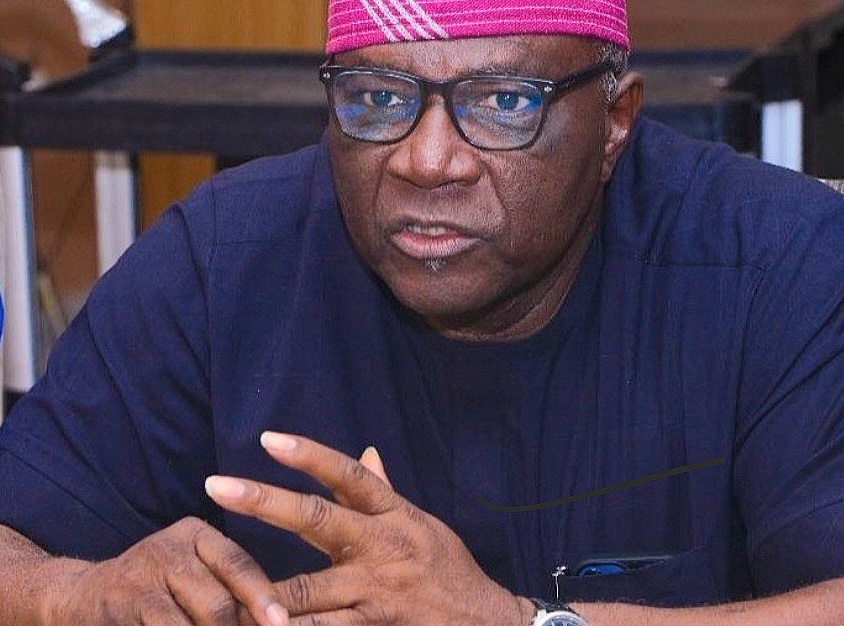
By Bayo Onanuga
Recent reports from the National Bureau of Statistics (NBS) have become a focal point of criticism and scepticism, especially by the political opposition and perpetual doubters of any positive report about our country.
In its Q2 labour survey report, the NBS says the unemployment rate fell from 5.3 % in Q1 to 4.3% in Q2. Compared to the unemployment rate of 5.3% in Q4 2022, the report shows some progress, as it also indicates lower level of youth unemployment.
The NBS also reported that GDP growth in the third quarter rose to 3.46% year-on-year in real terms, higher than the 2.54% recorded in Q3 2023 and above the second quarter growth of 3.19%.
The report stated that the GDP’s performance in the third quarter of 2024 was driven mainly by the Services sector, which recorded a growth of 5.19% and contributed 53.58% to the aggregate GDP. The agriculture sector grew by 1.14%, from the growth of 1.30% recorded in the third quarter of 2023. The industry sector’s growth was 2.18%, an improvement from 0.46% recorded in the third quarter of 2023.
“In terms of share of the GDP, the services sector contributed more to the aggregate GDP in the third quarter of 2024 compared to the corresponding quarter of 2023.
“In the quarter under review, aggregate GDP at basic price stood at N71,131,091.07 million in nominal terms. This performance is higher than the third quarter of 2023, which recorded an aggregate GDP of N60,658,600.37 million, indicating a year-on-year nominal growth of 17.26%.
Amid a singer’s uninformed opinion that went viral on social media that our country’s economy is in shambles, the NBS sounded positive, reporting that the economy is improving, as proven by the successive growth from Quarter one of 2024 up until Quarter 3.
Ordinarily, such positive reports should elicit hope and joy that our country’s economy is getting out of the woods, but they were instead met with skepticism from some quarters.
Unfounded allegations by critics that the data was manipulated fail to recognise the transparent and robust methodologies employed by the NBS. These methodologies are continually reviewed and improved to ensure reliability, providing a solid foundation for the data presented.
In contrast, when the NBS reported that inflation figures rose, these same voices quickly endorsed the report, illustrating some Nigerians’ selective acceptance of data based on preconceived narratives and confirmation bias rather than its authenticity.
It is crucial to emphasise that the NBS operates as an independent entity committed to providing accurate and objective data. These statistics are not mere numbers; they are derived from comprehensive research and analysis, reflecting the multifaceted realities of our national economy. The processes align with global best practices, and the bureau’s methodologies are continually reviewed and improved to ensure reliability.
Moreover, the positive economic indicators should be viewed as milestones in the ongoing efforts by the Tinubu administration to strengthen Nigeria’s economy. The figures by NBS reflect that a combination of government initiatives is yielding fruits, boosting the service sector and the stock and bond market, creating jobs, and driving sustainable growth. These developments, sooner than later, will translate into improved living standards, increased job opportunities, and a more robust economy for all Nigerians.
While challenges remain, dismissing progress in a knee-jerk manner, as some Nigerians do, negates the hard work of the government and the private sector, which contributed to these achievements.
The same way some Nigerians dismiss and deride economic data is very prevalent on the judicial front and in the work of the Independent National Electoral Commission. When a politician wins an election or a legal case, the singsong is that it has been a fair contest and justice has been delivered; however, when a candidate or party loses, the supporters binge on derision against INEC or the judges. Only recently, a prominent Nigerian went abroad to dismiss the 2023 election as a travesty because his candidate did not win the poll or the legal challenge instituted.
As Nigerians, we must respect our judicial system, even when the outcome does not favour us. The symbol of justice is a pendulum, and judges uphold justice based on the rule of law, without public pressure or sentiment. Accusations of corruption, whenever verdicts defy personal expectations, undermine the integrity of our courts and the democratic principles we cherish. We must turn the page over these matters and stop clinging to skepticism when presented with favourable data reflecting our nation’s progress. Those who truly want Nigeria to become a great country we all claim we seek will not use every opportunity to take out the flames of national progress. While the challenges remain and are being addressed, we must always recognise and celebrate every progress.
– Onanuga is Special Adviser to President Tinubu on Information and Strategy
-
Politics1 week ago
Those indicted for attacks on Rivers LG secretariats won’t go free – Fubara vows
-

 Sports1 week ago
Sports1 week agoEPL: Why Man Utd lost 2-0 to Arsenal – Amorim
-

 News1 week ago
News1 week agoAlleged fraud: Pastor Tobi Adegboyega won’t be deported to Nigeria, not indicted – UK lawyer
-

 Entertainment7 days ago
Entertainment7 days agoAsake ranked most streamed Nigerian artiste on Spotify
-

 News1 week ago
News1 week agoEFCC announces biggest asset recovery as govt official forfeits estate with 753 duplexes
-
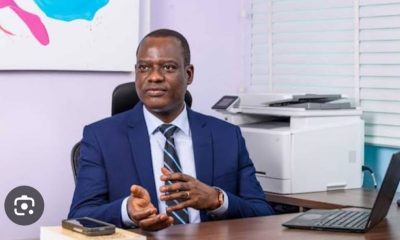
 Opinions1 week ago
Opinions1 week ago10 ways the Tax Bills will make states richer
-

 Business3 days ago
Business3 days agoWhy Naira is appreciating massively against dollar – CPPE
-

 News1 day ago
News1 day agoUS issues new visa directive for immigrant visa applicants


